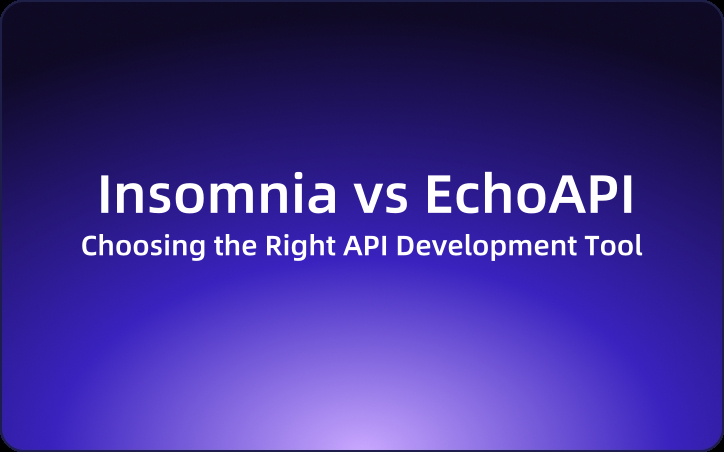Choosing the Right API Development Tool: Insomnia vs EchoAPI
This article explores the appropriate use cases and limitations of Insomnia and EchoAPI to help developers and teams choose the tool best suited to their needs.
In the realm of API development, selecting the right tool can significantly impact productivity and collaboration efficiency. Two popular tools in this space, Insomnia and EchoAPI, each offer unique features and advantages. This article explores the appropriate use cases and limitations of Insomnia and EchoAPI to help developers and teams choose the tool best suited to their needs.
Insomnia: Advantages and Limitations
Insomnia is a powerful open-source API client favored by developers for its script capabilities. It is particularly useful for solo developers who prioritize privacy and are accustomed to complex technical setups.
Advantages of Insomnia
- Open Source and Local Data Storage Needs: Insomnia appeals to users who prefer open-source platforms, ensuring control over privacy and data management.
- Solo Developers: Ideal for individual developers who need to efficiently send requests and manage collections without extensive collaboration features.
- Familiarity with OAS and Test Scripts: Best suited for users familiar with the OpenAPI Specification (OAS), where creating and executing test scripts is crucial for complex API testing and validation.
Limitations of Insomnia
- Separation of Specification and Requests: One significant drawback is the separation of API specifications from requests, which can lead to inconsistencies.
- Steep Learning Curve: Users must be well-versed in OAS and scripts, with a learning curve that is not beginner-friendly. Insomnia's scripts are incompatible with Postman, potentially hindering collaboration with teams that use Postman.
- Lack of Collaboration Features: The tool lacks robust collaboration capabilities, making team projects challenging. Updating APIs often necessitates rewriting scripts.
- Unintuitive User Interface: The user interface is frequently criticized for being non-intuitive and poorly organized, which can impede productivity.
EchoAPI: Advantages and Limitations
EchoAPI is an ultra-lightweight collaboration tool for API development that supports Scratch Pad. It's a perfect alternative to Postman, offering features like API design, debugging, automated testing, and load testing. Plus, it comes with plugins for IntelliJ IDEA(EchoAPI for IntelliJ IDEA), extension for VS Code(EchoAPI for VS Code), and a Chrome request capture extension(EchoAPI Interceptor), all without the need to log in.
EchoAPI is designed for teams, offering advanced collaboration features and an intuitive interface. It simplifies the creation and management of API specifications and tests, making it well-suited for team-based environments.
Advantages of EchoAPI
- Team Collaboration in API Development: Tailored for development teams that require seamless collaboration during API development.
- Intuitive User Interface: Features a visually appealing and user-friendly interface, facilitating easy navigation and use.
- Visual API Specification and Testing: Users can visually create API specifications and tests, simplifying the development process and ensuring compatibility with Postman scripts.
- Real-time API Updates: Changes in API specifications are automatically reflected in requests and tests, maintaining consistency without rework.
- Automatic Generation of Requests and Logical Orchestration: Supports automatic generation of API requests, enhancing testing and development efficiency through logical orchestration of requests and data flows.
Limitations of EchoAPI
- Iteration frequency: The EchoAPI product iterates at a fast pace, which might be a hassle for users who prefer not to update frequently.
Feature Comparison: Insomnia vs EchoAPI
| Feature | Insomnia | EchoAPI |
|---|---|---|
| HTTP Request Sending | ✅ | ✅ |
| WebSocket Support | ✅ | ✅ |
| SOAP Support | ✅ | ✅ |
| GraphQL Support | ✅ | ✅ |
| gRPC Support | ✅ | ✅ |
| SSE Support | ✅ | ✅ |
| Visual API Design | 🚫 | ✅ |
| OAS Import/Export | ✅ | ✅ |
| Schema Definition & Reuse | 🚫 | ✅ |
| Request to API Spec Parsing | 🚫 | ✅ |
| Example Auto-generation | 🚫 | ✅ |
| Branching | 🚫 | ✅ |
| Pre/Post Request Scripts | ✅ | ✅ |
| Response Validation | 🚫 | ✅ |
| Database Connection | 🚫 | ✅ |
| Multi-service Reference | 🚫 | ✅ |
| Visual Orchestration of Tests | 🚫 | ✅ |
| Visual Assertions | 🚫 | ✅ |
| CI/CD Integration | ✅ | ✅ |
| Collection Execution | ✅ | ✅ |
| Scheduled Tasks | 🚫 | ✅ |
| Performance Testing | 🚫 | ✅ |
| Online Test Reports | 🚫 | ✅ |
| Self-Hosted Runner | 🚫 | ✅ |
| Custom Domain Documentation | 🚫 | ✅ |
| Custom Layout Docs | 🚫 | ✅ |
| Markdown Pages | 🚫 | ✅ |
| Version Management | 🚫 | ✅ |
| Fixed Response Mocking | ✅ | ✅ |
| Smart Mock Engine | 🚫 | ✅ |
| Cloud Mock Server | 🚫 | ✅ |
| Customizable Mocking Scripts | 🚫 | ✅ |
| Self-hosted Mock Server | ✅ | ✅ |
| IDE Plugin | 🚫 | ✅ |
Other important reasons to choose EchoAPI
- No login required
- Supports Scratch Pad
- Ultra lightweight
- 100% compatible with Postman script syntax
Conclusion
Insomnia and EchoAPI each have their strengths and weaknesses. Insomnia is preferred by individual developers and those interested in open-source, local storage solutions. In contrast, EchoAPI excels in team collaboration and comprehensive feature sets that enhance usability. The choice between these tools depends on the specific needs and priorities of the developers and their teams.









 EchoAPI for VS Code
EchoAPI for VS Code

 EchoAPI for IntelliJ IDEA
EchoAPI for IntelliJ IDEA

 EchoAPl-Interceptor
EchoAPl-Interceptor

 EchoAPl CLI
EchoAPl CLI
 EchoAPI Client
EchoAPI Client API Design
API Design
 API Debug
API Debug
 API Documentation
API Documentation
 Mock Server
Mock Server




